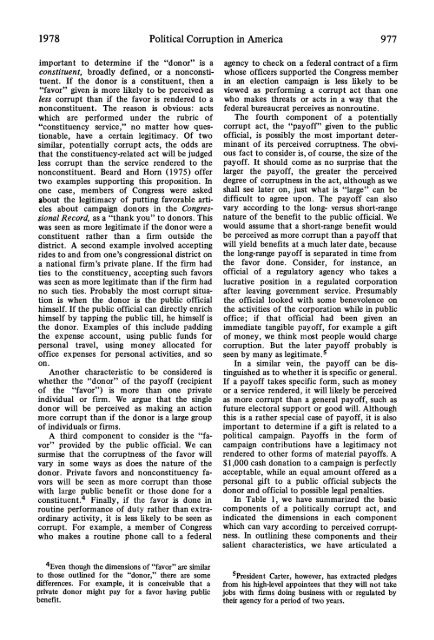Political Corruption in America: A Search for Definitions ... - See also
Political Corruption in America: A Search for Definitions ... - See also
Political Corruption in America: A Search for Definitions ... - See also
- No tags were found...
Create successful ePaper yourself
Turn your PDF publications into a flip-book with our unique Google optimized e-Paper software.
1978 <strong>Political</strong> <strong>Corruption</strong> <strong>in</strong> <strong>America</strong> 977important to determ<strong>in</strong>e if the "donor" is aconstituent, broadly def<strong>in</strong>ed, or a nonconstituent.If the donor is a constituent, then a"favor" given is more likely to be perceived asless corrupt than if the favor is rendered to anonconstituent. The reason is obvious: actswhich are per<strong>for</strong>med under the rubric of"constituency service," no matter how questionable,have a certa<strong>in</strong> legitimacy. Of twosimilar, potentially corrupt acts, the odds arethat the constituency-related act will be judgedless corrupt than the service rendered to thenonconstituent. Beard and Horn (1975) offertwo examples support<strong>in</strong>g this proposition. Inone case, members of Congress were askedabout the legitimacy of putt<strong>in</strong>g favorable articlesabout campaign donors <strong>in</strong> the CongressionalRecord, as a "thank you" to donors. Thiswas seen as more legitimate if the donor were aconstituent rather than a firm outside thedistrict. A second example <strong>in</strong>volved accept<strong>in</strong>grides to and from one's congressional district ona national firm's private plane. If the firm hadties to the constituency, accept<strong>in</strong>g such favorswas seen as more legitimate than if the firm hadno such ties. Probably the most corrupt situationis when the donor is the public officialhimself. If the public official can directly enrichhimself by tapp<strong>in</strong>g the public till, he himself isthe donor. Examples of this <strong>in</strong>clude padd<strong>in</strong>gthe expense account, us<strong>in</strong>g public funds <strong>for</strong>personal travel, us<strong>in</strong>g money allocated <strong>for</strong>office expenses <strong>for</strong> personal activities, and soon.Another characteristic to be considered iswhether the "donor" of the payoff (recipientof the "favor") is more than one private<strong>in</strong>dividual or firm. We argue that the s<strong>in</strong>gledonor will be perceived as mak<strong>in</strong>g an actionmore corrupt than if the donor is a large groupof <strong>in</strong>dividuals or firms.A third component to consider is the "favor"provided by the public official. We cansurmise that the corruptness of the favor willvary <strong>in</strong> some ways as does the nature of thedonor. Private favors and nonconstituency favorswill be seen as more corrupt than thosewith large public benefit or those done <strong>for</strong> aconstituent.4 F<strong>in</strong>ally, if the favor is done <strong>in</strong>rout<strong>in</strong>e per<strong>for</strong>mance of duty rather than extraord<strong>in</strong>aryactivity, it is less likely to be seen ascorrupt. For example, a member of Congresswho makes a rout<strong>in</strong>e phone call to a federal4Even though the dimensions of "favor" are similarto those outl<strong>in</strong>ed <strong>for</strong> the "donor," there are somedifferences. For example, it is conceivable that aprivate donor might pay <strong>for</strong> a favor hav<strong>in</strong>g publicbenefit.agency to check on a federal contract of a firmwhose officers supported the Congress member<strong>in</strong> an election campaign is less likely to beviewed as per<strong>for</strong>m<strong>in</strong>g a corrupt act than onewho makes threats or acts <strong>in</strong> a way that thefederal bureaucrat perceives as nonrout<strong>in</strong>e.The fourth component of a potentiallycorrupt act, the "payoff" given to the publicofficial, is possibly the most important determ<strong>in</strong>antof its perceived corruptness. The obviousfact to consider is, of course, the size of thepayoff. It should come as no surprise that thelarger the payoff, the greater the perceiveddegree of corruptness <strong>in</strong> the act, although as weshall see later on, just what is "large" can bedifficult to agree upon. The payoff can <strong>also</strong>vary accord<strong>in</strong>g to the long- versus short-rangenature of the benefit to the public official. Wewould assume that a short-range benefit wouldbe perceived as more corrupt than a payoff thatwill yield benefits at a much later date, becausethe long-range payoff is separated <strong>in</strong> time fromthe favor done. Consider, <strong>for</strong> <strong>in</strong>stance, anofficial of a regulatory agency who takes alucrative position <strong>in</strong> a regulated corporationafter leav<strong>in</strong>g government service. Presumablythe official looked with some benevolence onthe activities of the corporation while <strong>in</strong> publicoffice; if that official had been given animmediate tangible payoff, <strong>for</strong> example a giftof money, we th<strong>in</strong>k most people would chargecorruption. But the later payoff probably isseen by many as legitimate.5In a similar ve<strong>in</strong>, the payoff can be dist<strong>in</strong>guishedas to whether it is specific or general.If a payoff takes specific <strong>for</strong>m, such as moneyor a service rendered, it will likely be perceivedas more corrupt than a general payoff, such asfuture electoral support or good will. Althoughthis is a rather special case of payoff, it is <strong>also</strong>important to determ<strong>in</strong>e if a gift is related to apolitical campaign. Payoffs <strong>in</strong> the <strong>for</strong>m ofcampaign contributions have a legitimacy notrendered to other <strong>for</strong>ms of material payoffs. A$1,000 cash donation to a campaign is perfectlyacceptable, while an equal amount offered as apersonal gift to a public official subjects thedonor and official to possible legal penalties.In Table 1, we have summarized the basiccomponents of a politically corrupt act, and<strong>in</strong>dicated the dimensions <strong>in</strong> each componentwhich can vary accord<strong>in</strong>g to perceived corruptness.In outl<strong>in</strong><strong>in</strong>g these components and theirsalient characteristics, we have articulated a5President Carter, however, has extracted pledgesfrom his high-level appo<strong>in</strong>tees that they will not takejobs with firms do<strong>in</strong>g bus<strong>in</strong>ess with or regulated bytheir agency <strong>for</strong> a period of two years.
















